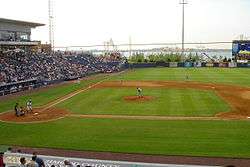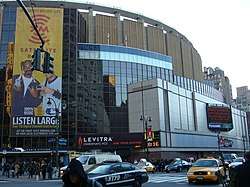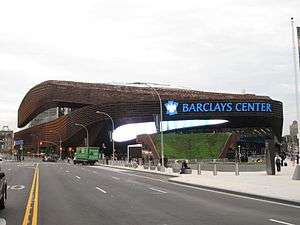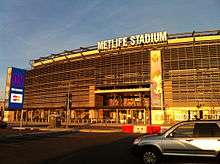Richmond County Bank Ballpark
The Richmond County Bank Ballpark at St. George (RCB Ballpark) is a baseball stadium located on the north-eastern tip of Staten Island. The ballpark is the home of the Staten Island Yankees, the NY-Penn League affiliate of the New York Yankees, and of Wagner College Seahawks Baseball. The ballpark was also home of the city's Pro Cricket team the New York Storm in 2004. In addition, local high schools have the chance to play at least one game at the Richmond County Bank Ballpark. The Ballpark at St. George is more commonly referred to as Staten Island Yankees Stadium instead of its proper name, whose naming rights were given to Richmond County Savings Bank.
 | |
| Location | 75 Richmond Terrace Staten Island, New York 10301 |
|---|---|
| Coordinates | 40°38′44.07″N 74°4′35.14″W |
| Owner | City of New York |
| Operator | Staten Island Yankees |
| Capacity | 7,171 |
| Field size | Left Field: 320 feet (98 m) Center Field: 390 feet (119 m) Right Field: 318 feet (97 m) |
| Surface | Natural Grass |
| Construction | |
| Broke ground | June 8, 2000[1] |
| Opened | June 24, 2001[2] |
| Construction cost | $29 million ($41.9 million in 2019 dollars[3]) |
| Architect | Populous Architecture +[4] |
| Structural engineer | Simpson Gumpertz & Heger Inc.[5] |
| General contractor | Bovis-Lend Lease[4] |
| Tenants | |
| Staten Island Yankees (2001–present) Wagner Seahawks baseball (2008–present) New York Storm (2004) | |
History


Site
The site on which the ballpark was built, on St. George overlooking New York Harbor, was once the site of the B&O Railroad rail yards for the City of New York, and the current stadium parking lot was the site of Major League Baseball in the 1880s. The New York Metropolitans of the American Association played at the St. George Grounds in 1886–1887 and the New York Giants played there while awaiting the construction of the second Polo Grounds.
Richmond County Bank Ballpark was part of a deal with both the Yankees and New York Mets, brokered by then-Mayor Rudy Giuliani. Due to Major League Baseball territory rules, the Yankees and Mets have veto power over each other (and any other Major League Baseball franchise), if they want to bring an affiliated minor-league team into the New York City metropolitan area. The Yankees and Mets had attempted to move minor-league teams to the area in the past, only to be turned down with their rival. With help (and public money) from the mayor, both teams agreed to allow each other to have a minor-league team in the city in return for new stadiums. The Mets moved a franchise to a new stadium, called Keyspan Park (renamed MCU Park in 2010), in the Coney Island section of Brooklyn.
A groundbreaking ceremony was held on June 8, 2000, upon which RCB's sponsorship was announced.[1] The park opened a little more than a year later on June 24, 2001.[2]
Use
When the September 11 attacks happened across New York Harbor, the RCB Ballpark was used as a staging area for emergency workers due to its proximity to the Staten Island Ferry's St. George Terminal, and thus to Manhattan. After the attacks, the RCB Ballpark soon became a "spiritual link and sight line to Manhattan" for Staten Island residents.[6]
In 2005, RCB Ballpark hosted two of the four concerts of the Across the Narrows Festival. The other two concerts took place simultaneously at KeySpan Park. On August 17, 2010, RCB Ballpark hosted the NY-Penn League All Star Game. This was the ballpark's first opportunity to host the game and the second time that it was held in New York City.[7]
On August 5, 2017, Impact Wrestling hosted a live event at the stadium. 1,100 fans attended the event.
Beginning in 2018, the Richmond County Bank Ballpark was host to the MAAC Baseball Tournament.,[8] the stadium will continue to host the tournament until at least 2023.[9]
Design
.jpg)
The Richmond County Bank Ballpark was designed by Populous. It was designed to take advantage of the stadium's location overlooking New York Harbor. The main entrance to the stadium is located on street level with the seating bowl and field built below street level. Sails at each entrance are a reference to the Staten Island Ferry boats, which frequently pass nearby, and the St. George Ferry Terminal, which is about 0.33 miles (0.53 km) away. The batter's eye in center field is able to retract so that spectators can view the Manhattan skyline.
RCB Ballpark has 18 regular-sized luxury suites along with a 60-person Skyline Suite with one of the best views of the harbor. A small kids’ area is located down the left-field line with games.
A replica of the Verrazzano-Narrows Bridge is located on top of the main scoreboard.
The outfield walls have changed several times over the course of the stadium's history. Originally the stadium had four LED video boards spaced out on the outfield wall that would display rotating advertisements throughout the game. After these boards malfunctioned the team replaced them with traditional signage along the wall. These signs were replaced with a new 200-foot-long (61 m) video board in right field in 2007. The new video board is one of the longest in the minors. Also in 2007 the Ballpark received a brand new high-definition main video board on top of the scoreboard.
Transportation
The St. George Terminal of the Staten Island Ferry is less than a five-minute walk from the ballpark. The S40 and S44 buses directly serve the stadium, but the stadium is accessible from the buses that terminate at the St. George Ferry Terminal.[10]
The St. George station of the Staten Island Railway is also at the ferry terminal. From 2001 to 2009, on game days during the baseball season, SIR trains served the RCB Ballpark station adjacent to the stadium, with trains from both St. George and Tottenville.[11] In 2010, train service to RCB Ballpark station was suspended due to budget cuts from the MTA.[12][11]
References
- Lueck, Thomas J. (June 9, 2000). "Bank Puts Its Money, and Its Name, on Staten Island Ballpark". The New York Times. ISSN 0362-4331. Retrieved November 16, 2019.
- Araton, Harvey (June 25, 2001). "Sports of The Times; A Ballpark a Skeptic Can Love". The New York Times. ISSN 0362-4331. Retrieved November 16, 2019.
- Federal Reserve Bank of Minneapolis. "Consumer Price Index (estimate) 1800–". Retrieved January 1, 2020.
- Rope, John (April 9, 2001). "Lexington, Others Continue Building Boom for Minors". SportsBusiness Journal. Retrieved September 14, 2011.
- "Ballpark at St. George". Architectural Record. 2001. Retrieved June 3, 2014.
- Araton, Harvey (June 19, 2002). "Keeping Eye on the Ball, Not the Skyline; At a Staten Island Ballpark, the View Has Changed, but Dreams Endure". The New York Times. ISSN 0362-4331. Retrieved November 16, 2019.
- Pimpsner, Robert M. (December 1, 2009). "Battle of the Boroughs to Kick Off 2010 NY-Penn League Season". Baseball Digest. Retrieved March 10, 2010.
- https://maacsports.com/news/2018/5/23/maac-baseball-championship-begins-new-era-on-staten-island.aspx
- https://maacsports.com/news/2019/9/5/maac-baseball-championship-to-stay-in-staten-island.aspx
- "Staten Island Bus Map" (PDF). Metropolitan Transportation Authority. August 2018. Retrieved August 18, 2018.
- "2010 NYC Transit Service Reductions" (PDF). mta.info. Metropolitan Transportation Authority. January 27, 2010. Archived from the original (PDF) on November 25, 2010. Retrieved August 2, 2015.
- Office of Diane J. Savino (2013). "State Senator Diane J. Savino's 2013 Staten Island Railway Rider Report" (PDF). nysenate.gov. New York State Senate. Archived from the original (PDF) on February 7, 2014. Retrieved July 31, 2015.
External links
| Wikimedia Commons has media related to Richmond County Bank Ballpark. |


